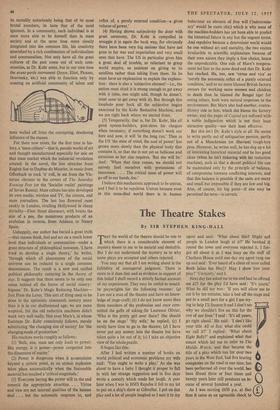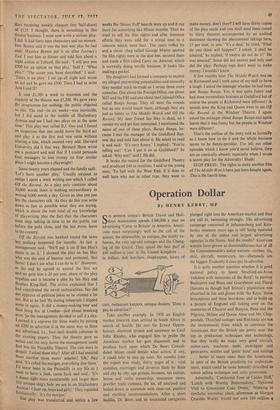The Theatre Stakes
By SIR STEPHEN KING-HALL rrHAT the world of the theatre should be one in I which there is a considerable element of mystery seems to me to be natural and desirable. But I do not understand the mystery as to why some plays are accepted and others rejected.
You may say that all I am writing about is the fallibility of managerial judgment. There is more to it than that and as evidence in support of this belief I shall record a strictly factual account of my experiences. They may be useful to would- be playwrights for the following reasons : (a) I am not a man of the theatre and have no know- ledge of stage-craft; (b) I do not know more than three members of the profession and once com- mitted the gaffe of asking Sir Laurence Olivier, 'Who is the pretty girl over there? She should be on the stage.' My wife,' he replied; (c) I rarely have time to go to the theatre; (d) I have never put any money into the theatre but have taken quite a lot out of it; (e) I take an objective view of the whole puzzle.
It began like this : After I had written a number of books on world political and economic problems my wife said: 'You ought to write a play.' As she was about to have a baby I thought it proper to fall in with her strange suggestion and in five days wrote a comedy which made her laugh. A year later when I was in HMS Repulse it fell to my lot to put on a ship's show at Gibraltar. I put on this play and a lot of people laughed so I sent it to my agent and said: 'What about this? Might not people in London laugh at it?' He hawked it round the town and everyone rejected it. I for- got all about it as I was busy on the staff of Chatham House until one day my agent rang me up and said: 'Ever heard of a client of mine called Beith [alias Ian Hay]? May I show him your play?' Certainly,' said I.
Next day Ian asked me to tea and had he offered me £25 for the play I'd have said: 'It's yours.'
What he did say was: 'If you will allow me to cut it by ten minutes, take a bed off the stage and put in a small part for a girl I am try- ing to help I'll finance it and I don't see why we shouldn't live on this for the rest of our lives.' I said : 'It's all yours, go right ahead.' He said : 'I don't like your title All at Sea; what else could we call it?' I replied : 'What about Eight Bells?' and explained what that meant which led me to refer to The Middle Watch; and that became the title of a play which ran for over two years in the West End, had five touring companies on the road at one time, has been performed all over the world, has been filmed three or four times and twenty years later still produces an in- come of several hundred a year.
As I was earning £650 p.a. at that time it came as an agreeable shock to start receiving weekly cheques (my half-share) of £125. I thought, there is 'something in this theatre business. I must now write a serious play. I did. It had forty men characters and no women. Ivor Brown said it was the best war play he had seen; Maurice Brown put it on after Journey's End. I met him at dinner and told him about a night action at Jutland. He, said : 'I will pay you £500 for an option on that play.' Said I: `What play?' The scene you have described.' I said : `There is no play.' I sat up all night and wrote an act and he gave me £500. Then I had to write Acts I and 11!
It cost £1,500 a week to maintain and the capacity of the theatre was £1,300. We gave away the programme for nothing; the public objected to this. The end—in six weeks—was inevitable, but I did stand in the middle of Shaftesbury Avenue and see I had two plays on at the same time! This play was called B.J. One and I found on inspection that one could move the third act and play it as the first and vice versa without altering a line, which seemed very odd. Harvard University did it that way. Bernard Shaw wrote me a postcard and said that if I could persuade four managers to lose money on four similar plays 1 might become a playwright!
Some twenty years elapsed and the family said: 'Let's have another play.' Usually anxious to oblige I spent a week writing one which I called Ofl the Record. As a play only contains about 30,000 words there is nothing extraordinary in writing 4,000 words a day. Given an idea one just lets the characters talk. As they do this you write down as fast as possible what they are saying, which is about the sum total of my knowledge of playwriting plus the fact that the characters must stop talking in time to let the public out before the pubs close, and the last trains leave to the country.
Oil the Record was hawked round the town but nothing happened for months. At last a management said: 'We'll put it on if Ian Hay's name is on it.' I showed the play to Ian Hay who was the soul of honour and protested, 'But Steve! I don't see what I can do to it!' However, in the end he agreed to amend the first act and we gave him a 20 per cent. share of the play royalties and it became a play by Ian Hay and Stephen King-Hall. The critics explained that I had contributed the naval technicalities. Ian did not approve of political jokes so he crossed a lot out. But as he had 'flu during rehearsals I slipped some in again. It did a money-making tour and then hung fire in London—just about breaking even. So the management decided to call it a day. I earned it a reprieve for three weeks. by putting
w
up £200 to advertise it in the same way as films are advertised, i.e., four-inch double columns in the evening papers. Then the theatre gave us notice and the only home the management could find was the Piccadilly Theatre. The cast were in despair. I asked them why? After all I had ensured them another three weeks' salaries! 'Oh,' they said, 'It's called the morgue, everything dies there.' I'd never been in the Piccadilly in my life so I went to have a look, came back and said: 'It's a damn sight more comfortable and larger than this antique dog's hole we are in on Shaftesbury Avenue! Cheer up, boys and girls!' They repeated fatalistically : 'It's the morgue.'
The play was transferred and within a few weeks the 'House Full' boards were up and it ran there for something like fifteen months. Then we tried to sell the film rights and after immense efforts they were sold for a trivial sum to a concern which went bust. The years rolled by and a clever chap called George Minter spotted the film rights were in the dust-bin, secured them and made a film called Carry on Admiral, which is currently doing terrific business. It looks like making a packet.
My daughters had formed a company to exploit my alleged playwriting potentialities and naturally they needed stock-in-trade so I wrote three more comedies. One about the Foreign Office, one about M15 and the FBI and one about the Colonial Office called Bunga Bunga. They all went the rounds but no one would touch them; although they are just as funny as The Middle Watch and 011 the Record. My dear friend Ian Hay is dead, so I cannot try and get him interested. I mentioned the name of one of these plays, Bunga Bunga, be- cause I met the manager of the Guildford Rep. one day and told him about it. He asked to read it and said : 'It's very funny.' I replied: `You're telling me!' Can I put it on at Guildford?' he asked. `Why not?' said I. He did.
It broke the record for the Guildford Theatre and produced £40 in royalties. I said to the young man, 'To hell with the West End, if it does so well here why not in other reps, they want to make money, don't they? I will have thirty copies of the play made and you shall send them round to thirty theatres accompanied by an audited statement showing the phenomenal takings here, 15 per cent, to you.' It's a deal,' he cried. 'What do you think will happen?' I asked. 'I shall be amazed,' he replied, if twelve do not do it!' He was amazed! Some did not answer and only one' did the play. Perhaps reps don't want to make money. I wouldn't know.
A few months later The Middle Watch was on at Richmond and I took some of my staff to have a laugh. I asked the manager whether he had been sent Bunga Bunga. Yes, it was quite funny and had done tremendous business at Guildford but of
course the people at Richmond were different! A month later the King and Queen went to see Ofi the Record at the Windsor Theatre. I again asked the manager about Bunga Bunga and again learnt that it was funny but the people at Windsor were different !
That's the outline of the story told as factually as I know how to do it and the whole business seems to be funny-peculiar. I've left out other episodes which I know you'd never believe, they are so comically absurd; especially when I wrote a secret play for the Admiralty! Hush!
STOP PRESS: The rights to make another film of The Middle Watch have just been bought again. This is the fourth time.















































 Previous page
Previous page